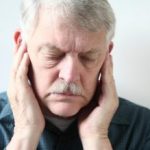
Thirty-six percent reported experiencing tinnitus on a constant basis.
Tinnitus is a condition in which a person hears sounds (ringing) even though there isn’t any. It may sound like buzzing, ringing, or humming. The noise can be so bothersome it could interfere with thinking, speaking, and even sleep.
Tinnitus worsened by insomnia, research on tinnitus and hyperacusis may help develop new testable model
A study has found that tinnitus – ringing in the ears – is aggravated by insomnia. Over 36 million people suffer from tinnitus, a health condition that causes ringing, buzzing, or humming in the ears even when there is no sound present. This condition can result in a poor quality of life and health. The study revealed that the severity of tinnitus worsened among patients who suffer insomnia.
Coauthor of the study Kathleen L. Yaremchuk said, “Tinnitus involves cognitive, emotional, and psycho-physiological processes, which can result in an increase in a patient’s distress. Sleep complaints, including insomnia, in these patients may result in a decrease in their tolerance to tinnitus.”
Other factors known to worsen tinnitus include loud noises, ear wax buildup, ear or sinus infection, head and neck trauma, fibromyalgia, Lyme disease, and thoracic outlet syndrome. Continue reading…


If you’ve ever wondered – how does TMJ (temporomandibular joint) disorder cause tinnitus and hearing problems? – read on. But to understand how TMJ problems affect hearing, it’s important to first understand what TMJ is.
Perhaps the most common TMJ condition is known as “locked jaw”. The jaw joints are responsible for opening the mouth, speaking, and chewing. When these joints get damaged, your ability to perform these functions becomes limited and your jaw may feel as if it is locked. TMJ disorders can be brought on by trauma to the area or a dislocated fibrous disc that sits on the hinge joint. TMJ problems can cause pain and limit your ability to eat or even speak.
Previous studies have found a strong association between TMJ disorders and tinnitus (ringing in the ears). Patients with TMJ problems are more likely to experience tinnitus, similar to individuals with a head or neck injury. Continue reading…
Tinnitus is a key symptom of Meniere’s disease, which is an inner ear disorder. Tinnitus is characterized by ringing, humming, or buzzing in the ears. Meniere’s disease is a long-term, progressive ear disorder that affects balance and hearing. Common symptoms of Meniere’s disease include sudden and severe vertigo, fluctuating tinnitus, increasing deafness, and the feeling of pressure of the inner ear.
The exact cause of Meniere’s disease is unknown, but there are factors that increase a person’s risk of developing the condition. These risk factors include increased pressure of the fluid in the endolymphatic sac and allergic factors damaging the inner ear. Still, the exact association between these risk factors and Meniere’s disease pathogenesis is not fully understood. Continue reading…
Magnetic therapy treatment may significantly improve tinnitussymptoms. Already being used for patients with depression, transcranial magnetic therapy (TMT) may also benefit those with tinnitus.
Researcher Dr. Murali Rao said, “Tinnitus could be for a number of reasons. Once all has been done to rule out the common causes of tinnitus, such as blood vessel problems and anything to do with the nervous system, we then look at the chronic tinnitus sufferers where no cause or remedy has been found. There has been a close association between psychological disorders, like anxiety and depression, and tinnitus.”
“TMS [transcranial magnetic stimulation] has an effect on the neurocircuitry of the brain. It’s a way of modulating the connectivity within the brain, and we use that for treatment of depression. What we are trying to find out is how much the treatment has an effect on depression, and we will see what happens with tinnitus at the same time,” added Dr. Rao. Continue reading…
Hyperacusis is an increased sensitivity to ordinary sounds which can cause significant distress to one’s day-to-day life. Hyperacusis can vary greatly. For example, some patients may find loud noises intolerable, while others develop a fear of certain noises. Some may even experience pain in response to hearing certain noises.
Hyperacusis can affect anyone, but it is most common in children. In some cases, it may only be a minor nuisance, but at times it could negatively impact the quality of life of the affected individual.
Hyperacusis stems from a problem in the way the brain perceives noise. As a result, one may experience pain and discomfort. Patients with hyperacusis have an intolerance to sound. Some sounds may seem much louder than they actually are.
Daily functioning can be difficult for someone with hyperacusis. Something as simple as running water or the sound of dry leaves may bring about much discomfort. Some patients find these simple sounds so disturbing that their daily living becomes a constant challenge. Continue reading…